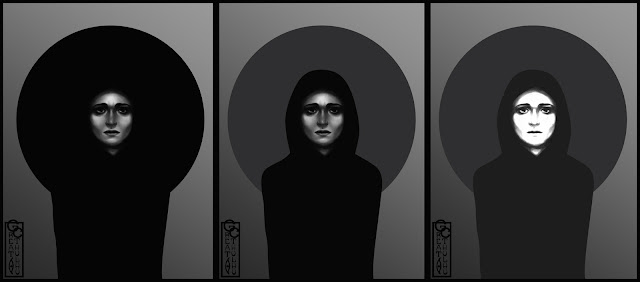Dystopian
Winds
Battle, Friction, Transition, all commence.
the wind interrogates -
Bullying its way into
the folds of her coat, and
Channelling its unwelcome fingers through her hair.
The Free Lady walks on.
Frayed puppet strings, flung and torn
Whistle past her ear -
A synthetic song: made at a time not long ago,
But similarly an age away,
Is extracted from ears, replaced by the sound
of whirring klaxons from loudspeakers.
The lies sung before are drowned in a sea of darkness
where the albatross flies in red.
The Free Lady does not halt.
In a bitten tree,
The sinews of a community
Rip, tear, and shred themselves on the jagged bark:
A knife-edge over which
The airs of Liberty are placed -
The Free Lady does not see, hear.
Dark clouds roll to meet her.
She is naked in defence -
The storms flow outside the teacups,
Twisting in wicked time
With the blaring of the futuresong -
“A warning!” - too late!
The free lady is cut.
Her free blood spilt.
The cold concrete shows no mercy on her body.
An ugly stain is purged with
The same Mechanical Efficiency
That tightened its grip as we spoke.
dystopian
"Utopian" describes a society that's conceived to be perfect. Dystopian is the exact opposite — it describes an imaginary society that is as dehumanizing and as unpleasant as possible.
George Orwell's "Animal Farm," for example, describes a dystopian society in which Napoleon, a pig, represents Joseph Stalin in a farmyard satire on Stalinist Russia and how power corrupts. Other famous dystopian authors include Aldous Huxley, Kurt Vonnegut, and Ray Bradbury. The adjective dystopian describes anything that pertains to or resembles a society such as those described in this sort of literature.


Comments
Post a Comment